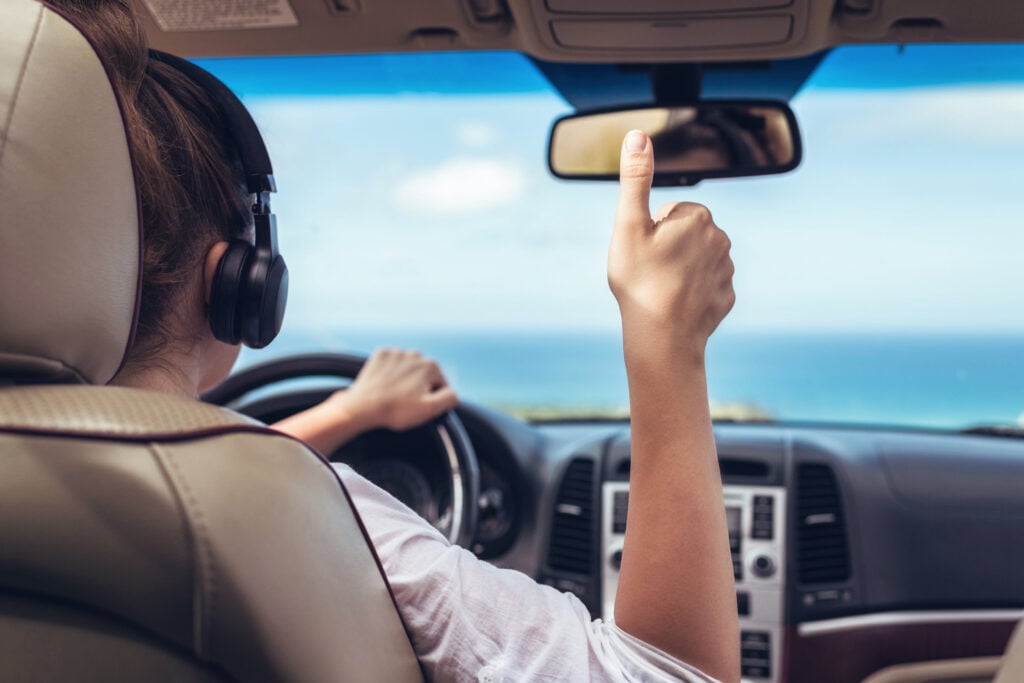
New hands-free driving laws took effect in Indiana on July 1, 2020. The laws were enacted to prevent instances of distracted driving, which is a significant cause of car accidents in Indiana. As with most new laws, people have questions about the specifics. One of the most common questions the personal injury lawyers at Lerner and Rowe hear is, “Is it illegal to wear headphones while driving in Indiana?”
The short answer is no. Indiana hands-free driving laws allow for the use of “a speakerphone, Bluetooth technology, earpiece, headphone, or other device that allows for hands-free communication.” However, even though it is legal to wear headphones while driving in Indiana doesn’t mean that you should sport your Beats by Dre every time you get behind the wheel. Lerner and Rowe will explain why the new Indiana hands-free driving laws were necessary and why headphones may not be the best choice.
Distracted Driving in Indiana
The Indiana hands-free driving laws make it illegal to use a mobile phone with your hands while driving, unless it’s an emergency situation. Over the last decade, distracted driving accidents caused by mobile phone use have skyrocketed. Mobile phones have become more advanced and apps have become more immersive, making it easy to take your eyes off of the road and your hands off of the steering wheel because of your phone.
According to the National Highway Transportation Safety Administration (NHTSA), 3,142 people died in distraction-affected car crashes in 2019. That figure represents almost 9% of all vehicular fatalities that year and a 10% increase from 2018’s distracted driving deaths.
The rapid increase of distracted driving accidents made the new Indiana hands-free driving laws an easy choice. By making it illegal to manually use a mobile phone while driving, the streets of Indiana will be safer.
It’s Legal to Wear Headphones While Driving in Indiana, But Should I?
The intent of the Indiana hands-free driving laws is to lower cases of distracted driving caused by mobile phone use. Using Bluetooth devices, voice assistants, and modern infotainment systems, such as Android Auto and Apple Carplay, can definitely help lessen distracted driving. While headphones can help you keep your eyes on the road and your hands on the steering wheel, they can also introduce another type of distraction.
Most drivers understand the importance of seeing the road and driving conditions ahead of them. Not everyone understands the importance of listening while driving. Headphones can prevent you from hearing emergency vehicle sirens, car crashes, horns honking at you, sounds of a failing engine, and more. Being able to hear these sounds is vital to keeping you and your passengers safe while driving.
If headphones are your only option for hands-free driving then it’s better to keep one cup on an ear and the other one open. That way you’ll be able to hear important sounds. However, it’s much better to use a hands-free method that keeps both of your ears free, for optimum safety.
Injured By a Distracted Driver? Contact Lerner and Rowe.
The personal injury attorneys at Lerner and Rowe hopes that this blog has helped you understand the new Indiana hands-free driving laws and why even though it’s legal to wear headphones while driving in Indiana, it’s not the best idea.
The new laws are sure to cut down on distracted driving accidents throughout the state, making the roads safer for everyone. However, distracted driving accidents will still happen, even if most people obey the laws. If you’ve been hit by a distracted driver then contact a Merrillville car accident attorney from Lerner and Rowe Injury Attorneys.
Lerner and Rowe is available 24 hours a day, 7 days a week by phone at 219-227-4993 and online through LiveChat. Not only will our attorneys do everything possible to win you the highest settlement possible, they’re also dedicated to helping you carry the emotional burden of an injury so that you can focus on recovery. Give us a call today and find out why Lerner and Rowe is one of the most trusted names in Merrillville personal injury law.
The information on this blog is for general information purposes only. Nothing herein should be taken as legal advice for any individual case or situation. This information is not intended to create, and receipt or viewing does not constitute, an attorney-client relationship.



